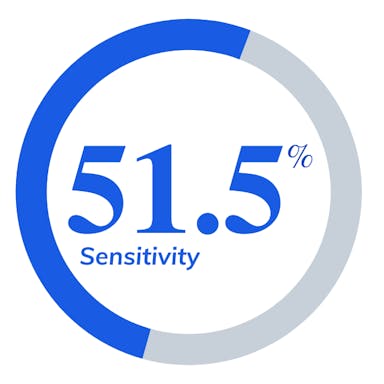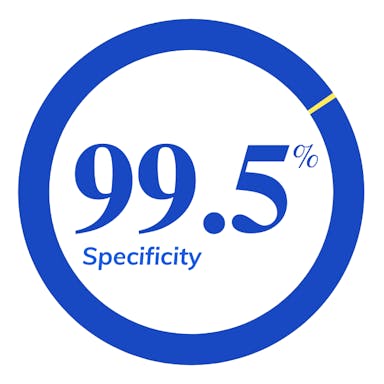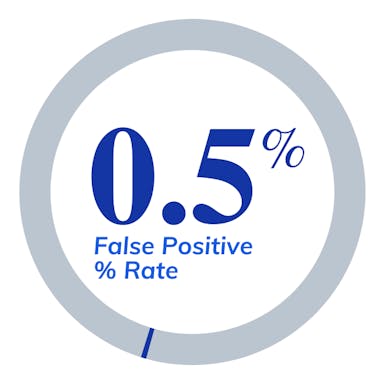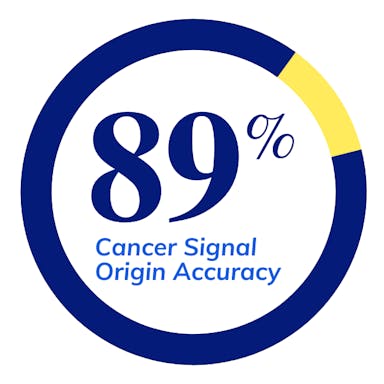
Galleri® Blood Test
Early Cancer Detection
The GRAIL cancer test can detect more than 50 types of cancer early, helping increase the chance of better outcomes.
Early Cancer Detection in Santa Rosa, CA
76% of cancer-related deaths in the US among patients 50–79 were caused by cancers not commonly screened for (1).
Can a Blood Test Detect Cancer?
Galleri compares the DNA in your bloodstream released from healthy cells to the DNA shed from cells that may be cancerous. This data to helps determine where the cancerous cells originated — so that you, your cancer team, and your naturopathic doctor at Premier Integrative can determine what actions are best to take next.

51.5% Sensitivity
The Galleri test has reported a “Cancer Signal Detected” result in roughly 52 patients out of 100 who had cancer (2).

99.5% Specificity
The Galleri test was nearly 100% accurate in reporting a “Cancer Signal Not Detected” among those who did not have cancer (2).

.5% False Positive Rate
The Galleri test reported, “Cancer Signal Detected,” in just 1 out of every 200 tests among individuals who did NOT have cancer (2).

89% Cancer Signal Origin Accuracy
The Galleri test correctly predicted the first Cancer Signal Origin 89 of 100 times when the test produced a “Cancer Signal Detected” result (2).
Beating Cancer Starts with Early Detection
Just 20% of people with a late-stage diagnosis will survive 5 years. Unfortunately, early detection technology only exists for a few cancers as single cancer tests. GRAIL's Galleri® test is a breakthrough approach to cancer screening. Instead of looking for cancer organ by organ, the Galleri® test has shown the ability to take a patient's blood sample to identify more than 50 different types of cancer.

How Does the Galleri® Blood Test Work?
All the cells in a patient’s body release DNA into the bloodstream. The DNA released by cancer cells is different than that of healthy cells. The Galleri® blood test looks at the DNA of a collected sample to determine if it contains any foreign DNA. If any foreign DNA is identified, it then predicts what area of the body it came from to help a patient’s healthcare provider guide the patient through their next steps.

What Does the Galleri® Cancer Test Tell a Patient?
The Galleri® test looks for signals that cancer is present. It does not detect all types of cancer. Therefore, it’s vital that patients continue with all routine screening tests recommended by their healthcare provider to maximize early detection. These include mammograms and colonoscopies.
Who Would Benefit from a Galleri® Test?
Generally speaking, the Galleri® test is recommended for use in adults with an increased risk of cancer — especially those 50 years or older.

Galleri® Test for those Between the Ages of 40-49
There are some risk factors that may cause patients 40-49 to have an elevated risk of developing cancer. These can include:
- Currently a smoker.
- Having quit smoking within the last 10 years.
- Having a first-degree relative (such as a parent, child, and/or full sibling) has or has had cancer.
- Having tested positive for HIV.
- Having received an organ transplant.

Who is Not Eligible for the Galleri® Test?
- Any patient who in the last three years has been diagnosed or treated for cancer. (This excludes those who have had Basal or squamous cell carcinomas of the skin. And those who have had Hormonal therapy (e.g., Tamoxifen, Arimidex, Aromasin) for breast cancer; patients must be 3 years past surgery, chemotherapy and/or radiotherapy but can still be taking hormonal therapy.)
- Those are 39 years of age or younger.
- Anyone currently pregnant.
- You live outside of California; Premier Integrative Medicine is not able to see patients outside of California.
References
1. Hackshaw, A., Cohen, S.S., Reichert, H. et al. Estimating the population health impact of a multi-cancer early detection genomic blood test to complement existing screening in the US and UK. Br J Cancer 125, 1432–1442 (2021). https://doi.org/10.1038/s41416-021-01498-4
2. Klein EA, Richards D, Cohn A, et al. Clinical validation of a targeted methylation-based multi-cancer early detection test using an independent validation set. Ann Oncol. 2021;32(9):1167-1177.